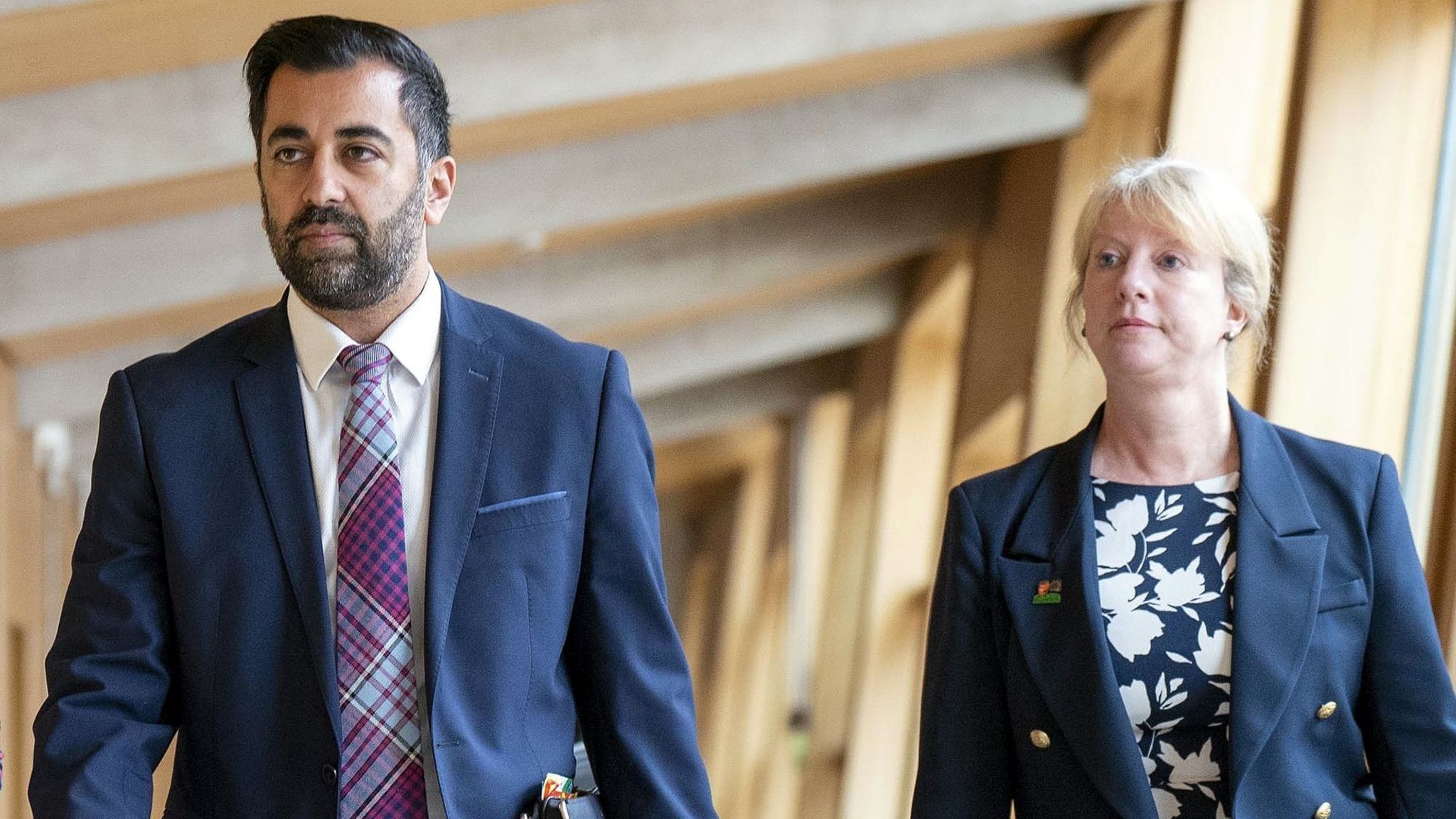Scottish government budget passes final vote
- Published
- comments

The Scottish government's budget has passed its final vote at Holyrood.
Finance Secretary Shona Robison said her £59.7bn spending plans would protect frontline services and include funding for a council tax freeze.
Extra revenue will be raised by new 45% and 48% income tax rates for higher earners, which were voted on last week.
But opposition parties warned the measures could harm economic growth and they criticised cuts for affordable housing.
The budget was passed by 68 votes to 55 with one abstention.
First Minister Humza Yousaf made the surprise promise of a year-long council tax freeze to help those struggling with the cost of living crisis when he addressed the SNP conference last October.
Scotland's 32 local authorities have been offered £147m as compensation, with an extra £62.7m also announced for those that freeze council tax. Ministers claim the freeze is "fully-funded".
However, a failure to consult with council leaders before the announcement led to a dispute over funding between the Scottish government and local government body Cosla which says not enough money is being provided to cover the policy.
Argyll and Bute Council's Conservative, Lib Dem and independent coalition was the first to defy SNP ministers when it voted for a 10% rise last week - although other councils have so far stuck to the freeze.
On Monday, Mr Yousaf told BBC Scotland News he was hoping to persuade Argyll and Bute to reconsider.
Yousaf hopes for council tax freeze across Scotland
The tax plans includes a new "advanced rate" tax band of 45% for those earning between £75,000 and £125,140
The top rate of tax, paid by those earning more than £125,000, will also rise from 47% to 48%.
It means Scotland will have six income tax bands from April, while England and Wales have three. Anyone earning over £28,500 will pay more in tax than they would if living south of the border, according to the Scottish Fiscal Commission.
Ms Robison told MSPs: "We are choosing to make our income tax system more progressive in order to help fund our vital frontline services."
She said Scotland's different tax rates would raise an extra £1.5bn, and she challenged anyone who preferred the UK tax rates and bands to "say where your hammer blow of £1.5bn of cuts would fall".
Other measures include an increase the Scottish Child Payment from £25 to £26.70 from April and £1.5m for local authorities to cancel school meal debt.
Funding for NHS boards will rise by £550m - or 4.3% - and amounts to £13.2bn which the government claims is an "above real terms" rise but capital spending on infrastructure such as new health centres is in doubt.
Policing is allocated £1.5bn including funding for body-worn cameras.
'Chaotic and incompetent"
The Scottish Conservatives said the budget was a "desperate attempt" to plug the hole in Scotland's finances.
Finance spokeswoman Liz Smith said the the choices exposed a fundamental divide in Scottish politics.
She said the divide was "between those of us who believe that the policy is to stimulate jobs, investment and economic growth and encourage aspirations to be the top priority" and those who favour the "so-called social contract" between the government and the public.
She said many leading business figures and groups were warning that tax divergence between Scotland and the rest of the UK was moving "beyond the tipping point" and would affect the economy.
Scottish Labour's finance spokesman Michael Marra described it as a "chaotic and incompetent" budget.
"It is not a budget for growth, it is not a budget for public services and it is not a budget that fights poverty," he said.
"It is a budget based on the economically and fiscally illiterate assumption that income tax can be left to plug the hole left by the SNP's failure to grow the economy."
He said the Institute of Fiscal Studies had described the government's presentation of its local government funding as "seriously misleading" and had "called out" its "spin" about investment in the NHS which he said faced a real terms cut.
The Scottish Lib Dem leader Alex Cole-Hamilton the budget showed ministers were "completely out of ideas" on how to drive growth and innovation.
During the Holyrood debate, the finance secretary addressed the nearly £200m in cuts to the affordable housing budget, a reduction of about 26%.
Ms Robison said they had been forced on her by funding cuts from Westminster, but she said the Scottish government still had a target to deliver 110,000 affordable homes by 2032.
She also promised that affordable housing would be a priority if more money becomes available for capital spending as a result of the chancellor's spring budget.
Cosla resources spokesperson Katie Hagmann said it was "not a good budget for Scottish local government", and councils were left with uncertainty over promises of potentially more funding which are dependent on UK government spending decisions.
- Published1 day ago
- Published14 February
- Published4 December 2023
- Published17 October 2023